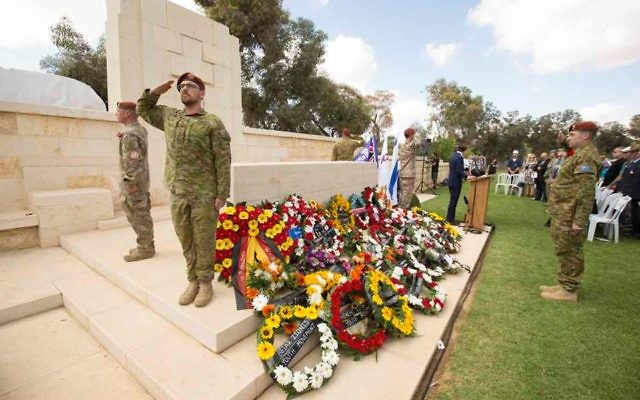99 years since Anzac charge
Some 99 years after the stunning Anzac success in Beersheva, one-time enemies came together for a moving remembrance ceremony.
BEERSHEVA – Some 99 years after the stunning Anzac success in Beersheva, one-time enemies came together for a moving remembrance ceremony.
As normal noisy life continued all around, a hush fell over Beersheva’s military cemetery on Monday, the anniversary of the Battle of Beersheva, when Australian officials started the traditional “service of remembrance”.
Soon, the Last Post echoed above this desert city, moving many in the audience – diplomats, dignitaries and members of the public – to tears. “For me the Last Post is always very stirring,” Andrew Fidge, Australian defence attache to Israel, remarked to The AJN.
He was dressed in full military uniform, as were many others, while local schoolchildren wore shorts and T-shirts, members of the public attended in everything from suits to beachwear, and dozens of Australian-Jewish gap year students wore their youth movement shirts.
Six Australian youth movements took their members there as part of the closing seminar of their gap years. For one student, Jordan Woods of Sydney, it felt deeply personal. “It feels close to me because my grandfather was in the RAAF as a navigator and he passed away last year. My dad and I go to dawn services for Anzac Day in Australia, so it’s special that I commemorate Anzac soldiers also here, during my gap year.”
Fidge confirmed that the buzz of a delegation from the Department of Veterans’ Affairs was the start of planning for a major centenary commemoration last year.
The team had flown in especially from Australia to start practical planning for the October 2017 ceremony, which will include a top-level Canberra politician.
Countries that fought with Australia, including New Zealand and Britain, sent representatives and laid wreaths, as did former foes Germany and Turkey.
“The presence of representatives of those nations here today reminds us that yesterday’s foe can be today’s friend,” said James McGarry, chargé d’affaires at the Australian embassy in Tel Aviv.
As well as unity between historic enemies, there was a strong sense of solidarity between Australia, New Zealand and Israel at the ceremony – and of interfaith harmony. The event ended with the three national anthems, and without a hint of awkwardness the ceremony featured Hebrew and English; Jewish and Christian prayer. At the end Samuel Fanous of the Emanuel Church in Ramla and Rabbi Raymond Apple, former senior rabbi of Sydney’s Central Synagogue, read the same psalm in English and Hebrew respectively.
McGarry spoke of the importance of the Battle of Beersheva in paving the way for the establishment of the Jewish State.
He noted that two days after the battle, Britain issued the Balfour Declaration, giving the nod to Jewish immigration to Palestine. “Together,” said McGarry, “these two developments – one in London, the other on this here ground – would set off a chain of events that would eventually lead to the creation of the modern State of Israel in 1948.”
As he honoured all of the Anzacs, McGarry gave special mention to the 50 light horsemen who were Jewish Australians, and remembered Major Eric Montague Hyman, who was raised in Tamworth and led the A Squadron of the 12th Light Horse Regiment.
The deputy mayor of Beersheva Tal Elal addressed the ceremony, saying that residents of his city have “an obligation to honour the sacrifice of the young soldiers who died.”
Some Beersheva residents attended the ceremony for the lack of other World War I commemorations in the region. Arkadi Aisenberg, a Russian immigrant to Israel, was standing with his five-year-old granddaughter Sheli, who was clutching an old photograph of a man. “This is my grandfather,” Aisenberg explained.
“He fought in World War I, for Russia, and we’re here because it’s a day to remember him.” Looking proudly at his granddaughter he said: “See what a span of generations is remembering.”
New Zealand’s ambassador to Israel spoke of his nation’s deep ties to the Middle East. “We are part of the history of this land, as it is part of ours,” said Jonathan Curr.
He continued: “The experiences of New Zealand and Australia in war – the Anzacs – became founding stories of emerging nationhood for both countries. In that sense, we share with the State of Israel a national identity that has been shaped in the crucible of conflict.”
He then turned to the subject of peace, saying: “If each generation must be continually reminded of the history of its forebears, surely one of our lessons is to prevent the sacrifice of future sons and daughters, leadership in peace is as important as leadership in battle.”
Curr said that he was “privileged” to attend Shimon Peres’ funeral, and noted his contribution to peace and his penchant for saying that he was more concerned for tomorrow than yesterday. Curr commented: “This does not mean that we should forget our history.”
NATHAN JEFFAY


comments